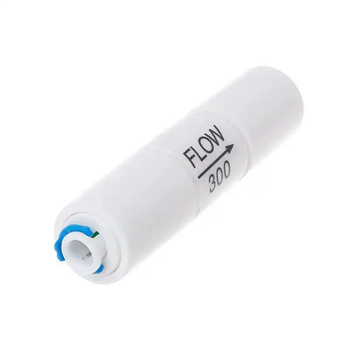Product added to cart
- Home
- Pure Water Blog
- Flow Restrictors: Enhancing Efficiency and Performance of Reverse Osmosis Systems
Flow Restrictors: Enhancing Efficiency and Performance of Reverse Osmosis Systems

Flow restrictors are small devices that are essential components of reverse osmosis systems. Their primary function is to regulate the flow of water through the system, ensuring optimal performance and efficiency. While they may seem insignificant compared to the complex filtration mechanisms of RO systems, flow restrictors play a vital role in achieving high-quality water purification.
Why are flow restrictors necessary in reverse osmosis systems?
The answer lies in the nature of the RO process itself. Reverse osmosis works by exerting pressure on water to force it through a semi-permeable membrane, effectively separating impurities and contaminants from the clean water. This pressure is crucial for the filtration process, as it determines the rate at which water flows through the membrane.
Flow restrictors serve as control valves that regulate this pressure and maintain a constant flow rate. By limiting the flow, they create the ideal conditions for efficient filtration. Here are three key benefits of using flow restrictors in reverse osmosis systems:
-
Enhanced Filtration Efficiency: Flow restrictors help maintain the appropriate pressure within the system, allowing the membrane to function optimally. By controlling the flow rate, they ensure that water remains in contact with the membrane for an adequate amount of time, maximizing the removal of contaminants. This results in superior filtration efficiency and cleaner water output.
-
Extended Membrane Lifespan: Proper flow control provided by restrictors prevents excessive pressure on the membrane, reducing the risk of damage or premature wear. By preserving the integrity of the membrane, flow restrictors contribute to its longevity and help avoid costly replacements or repairs.
-
Consistent Water Quality: Flow restrictors play a crucial role in ensuring consistent water quality. By maintaining a steady flow rate, they help achieve a stable concentration of impurities in the rejected water stream, preventing the accumulation of contaminants and ensuring that the purified water consistently meets the desired standards.
In summary, flow restrictors are essential components of reverse osmosis systems that optimize efficiency and performance. They regulate water flow, enhance filtration efficiency, extend the lifespan of the membrane, and ensure consistent water quality. If you have a reverse osmosis system or are considering installing one, make sure to prioritize the inclusion of a reliable flow restrictor to reap the benefits of a highly efficient and effective water purification system.
Remember, flow restrictors may be small in size, but their impact on the performance of your reverse osmosis system is significant. Invest in a quality flow restrictor to unlock the full potential of your water filtration system and enjoy clean, pure water for years to come.
Recent Posts
February 02, 2024
What's the Normal TDS for Drinking Water?
February 02, 2024
Unveiling the Most Accurate TDS Meter: Your Guide to Crystal-Clear Water Testing (2024 Update)
October 21, 2023
NPT vs. BSP Thread Types and Dimensions: A Comprehensive Guide
Archive
Tags
water purification
reverse osmosis
water filtration
water quality
drinking water
water contaminants
water treatment
clean water
RO system
water pressure
post-filter
safe drinking water
TDS meter
home water filtration
Total Dissolved Solids
clean drinking water
Water filtration systems
water filter
filter change
home appliances
household water
safe water
impurities
bacteria
pre-filter
filter efficiency
filter maintenance
filter replacement.
RO filters
sediment filter
carbon filter
reverse osmosis membrane
UV sterilization
waterborne pathogens
domestic reverse osmosis system
production rates
RO membrane
reverse osmosis systems
contaminants removal
fluoride removal
health
What filter removes 100% fluoride
How do you remove fluoride from tap water UK
Can fluoride be removed from tap water
How is fluoride removed
does boiling water remove fluoride
Fluoride removal from water
fluoride free water uk
fluoride removal filter
water filters that remove fluoride and chlorine uk

